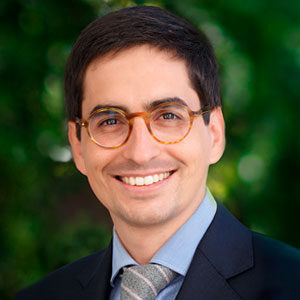Monday, March 3, 2025
Eduard Talamàs: Artificial Intelligence in the Knowledge Economy
- Hybrid
- Seminar

The DEL Seminar Series is proud to host a diverse roster of bright minds from around the world to discuss various subjects surrounding economics and technology.
On March 3, 2025, Eduard Talamàs, Assistant Professor of Economics at IESE Business School, joined us for his talk, “Artificial Intelligence in the Knowledge Economy.”
The rise of Artificial Intelligence (AI) has the potential to reshape the knowledge economy by automating cognitive, non-codifiable work. This paper introduces a framework to analyze this transformation, incorporating AI into an economy where humans form hierarchical firms to use their time and knowledge efficiently: Less knowledgeable individuals become “workers” engaging in routine knowledge work, while more knowledgeable individuals become “solvers” assisting workers with exceptional problems. We model AI as a technology that transforms computing power into “AI agents,” which can either operate autonomously (as co-workers or solvers/copilots) or non-autonomously (only as copilots). We show that basic autonomous AI displaces humans towards complex problem-solving, leading to smaller, less productive, and less decentralized firms. In contrast, advanced autonomous AI reallocates humans to routine knowledge work, resulting in larger, more productive, and more decentralized firms. While autonomous AI primarily benefits the most knowledgeable individuals, non-autonomous AI disproportionately benefits the least knowledgeable. However, autonomous AI achieves higher overall output. These findings reconcile seemingly contradictory empirical evidence and reveal key tradeoffs involved in regulating AI autonomy.
View paper
Eduard Talamàs
Assistant Professor, IESE Business School
Eduard Talamàs is an Assistant Professor of Economics at IESE Business School in Barcelona and a Research Fellow at the Centre for Economic Policy Research (CEPR). His research focuses on the economic effects of AI, organizational economics, bargaining and networked markets.
Eduard earned his Ph.D. in Economics from Harvard University in 2017, where he was mentored by Ben Golub. Following his doctorate, he was a postdoctoral fellow at the Warren Center for Network and Data Sciences at the University of Pennsylvania, hosted by Rakesh Vohra.
In 2022, Eduard was recognized as one of Poets&Quants’ Best 40 Under 40 MBA Professors, highlighting his impact in both economics research and MBA teaching.